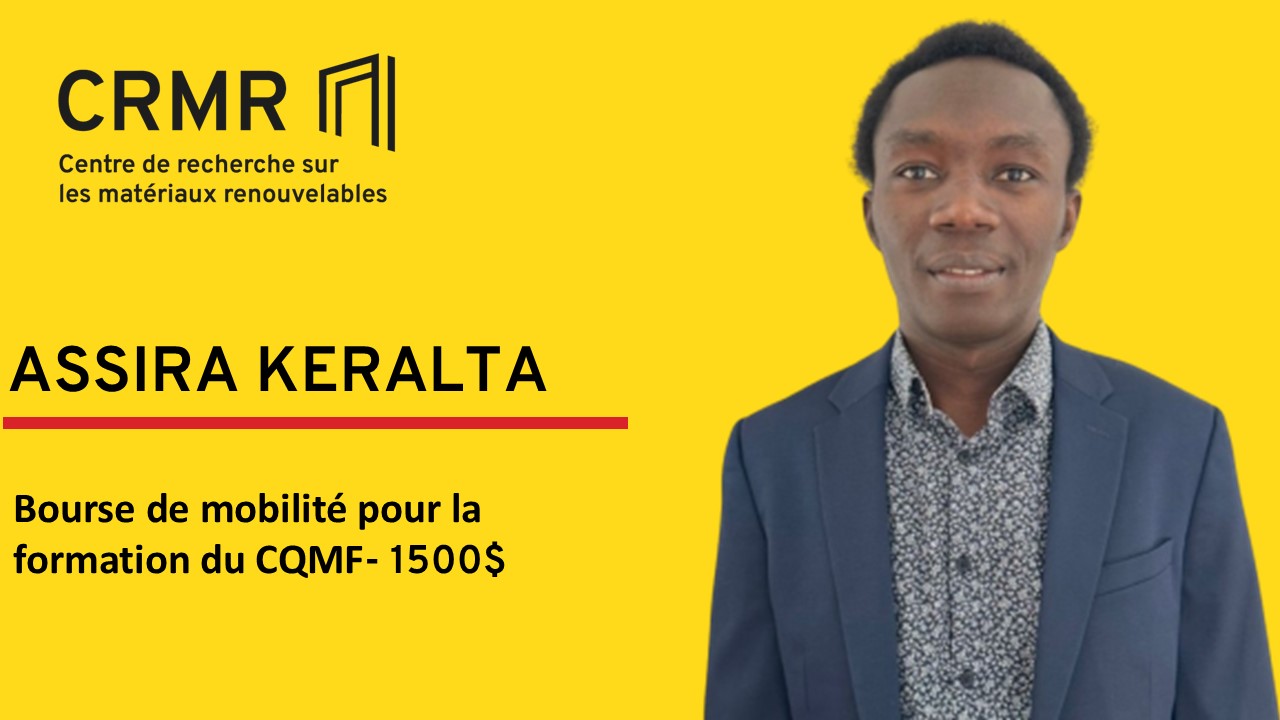Congratulations to Assira Keralta for winning the CQMF Mobility Scholarship for training, valued at $1,500!
Congratulations to Assira Keralta for winning the CQMF Mobility Scholarship for training, valued at $1,500.
Assira, a doctoral student in wood engineering and bio-based materials, is pursuing her research project under the supervision of Professor Véronic Landry and co-supervision of Julien Chamberland, in collaboration with Marie-Josée Dumont. This prestigious scholarship will cover her registration for an international conference in Japan focused on wood science and preservation. In addition to contributing to her personal development, this scholarship aims to diversify students’ training and enhance their CVs, providing increased visibility in a rapidly growing field.
This conference represents a unique opportunity for Assira to deepen her knowledge of the latest advances in wood preservation and protection, while offering a privileged space to share her research findings. Assira will also have the chance to interact with international experts, forging valuable connections that will foster global scientific collaboration. These interactions will not only enrich her technical knowledge but also play a key role in the development of her research project on the dimensional stabilization of wood, which involves the use of ultrafiltration permeate from whey. This experience will also contribute to enhancing her academic and professional skills.
Congratulations to Assira for this remarkable achievement!

Project Title: Characterization of Reaction Products Between Whey Ultrafiltration Permeate (WUP), Bio-based Acids, and Products Formed During Heating of WUP
Abstract:
Wood is increasingly valued for its environmental benefits, particularly carbon sequestration, recyclability, and sustainability. It is also appreciated for its aesthetic appeal and biophilic qualities. However, wood is a hygroscopic material, meaning it absorbs and desorbs moisture according to changes in the relative humidity of its environment. This leads to dimensional variations and, eventually, cracks and fissures. The movement of water within the wood also facilitates the penetration of microorganisms, leading to deterioration. Furthermore, exposure to UV rays results in color changes. All of these factors contribute to the loss of wood’s physical, mechanical, and aesthetic properties, making it less competitive compared to other materials. One solution to protect and preserve wood is the wood polyestification process. This treatment involves impregnating wood with chemical elements (an alcohol and a carboxylic acid) and inducing a reaction through esterification. This results in the formation of macromolecules within the wood that densify the cell walls and block the primary moisture absorption sites. However, the alcohols used in this process are often expensive, sourced from fossil fuels, or harmful to the environment and human health.
This is where whey ultrafiltration permeate (WUP) comes in, a byproduct of the dairy industry that is abundant in North America. In Quebec alone, between 500 million and 1 billion liters of WUP are produced annually. While it is used in animal feed, it remains largely underutilized and contributes to pollution. Nevertheless, WUP contains a high lactose content (over 88% of its dry weight). Lactose is an alcohol, which can serve as a substitute for traditional alcohols used in polyestification. WUP offers several advantages: it is already in solution, making it ready for wood impregnation; it is bio-based; it is abundant in North America; and it poses no risk to human health. Additionally, WUP contains phosphorus, a compound with flame-retardant properties, and its non-protein nitrogen content, combined with the acid, can help enhance the wood’s UV stability. Our objective is to use the lactose from WUP to develop a wood stabilization technology with a low environmental impact.

